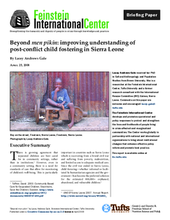There is growing agreement that separated children are best cared for in community settings, rather than in institutions. However, even in a community setting, there is a need for standards of care that allow for monitoring of children’s well-being. This is particularly important in countries such as Sierra Leone which is recovering from a brutal civil war and suffering from poverty, malnutrition, and limited access to adequate medical care. Since the civil war ended in Sierra Leone, child fostering—whether informal or facilitated by humanitarian agencies and the government—has become the preferred solution for the estimated 800,000+ orphaned, abandoned, and vulnerable children.
Interviews with care-givers, foster children, humanitarian agencies, and government officials paint a picture of a formal foster care system that lacks common standards or functioning monitoring mechanisms. These gaps in child protection are also apparent in the kind of informal fostering arrangements found throughout West Africa. This study evaluates the current state of child fostering in Sierra Leone and poses questions for future research which is necessary in order to improve knowledge and develop recommendations for national foster care standards—which could be potentially replicable across West Africa.
©Feinstein International Center

